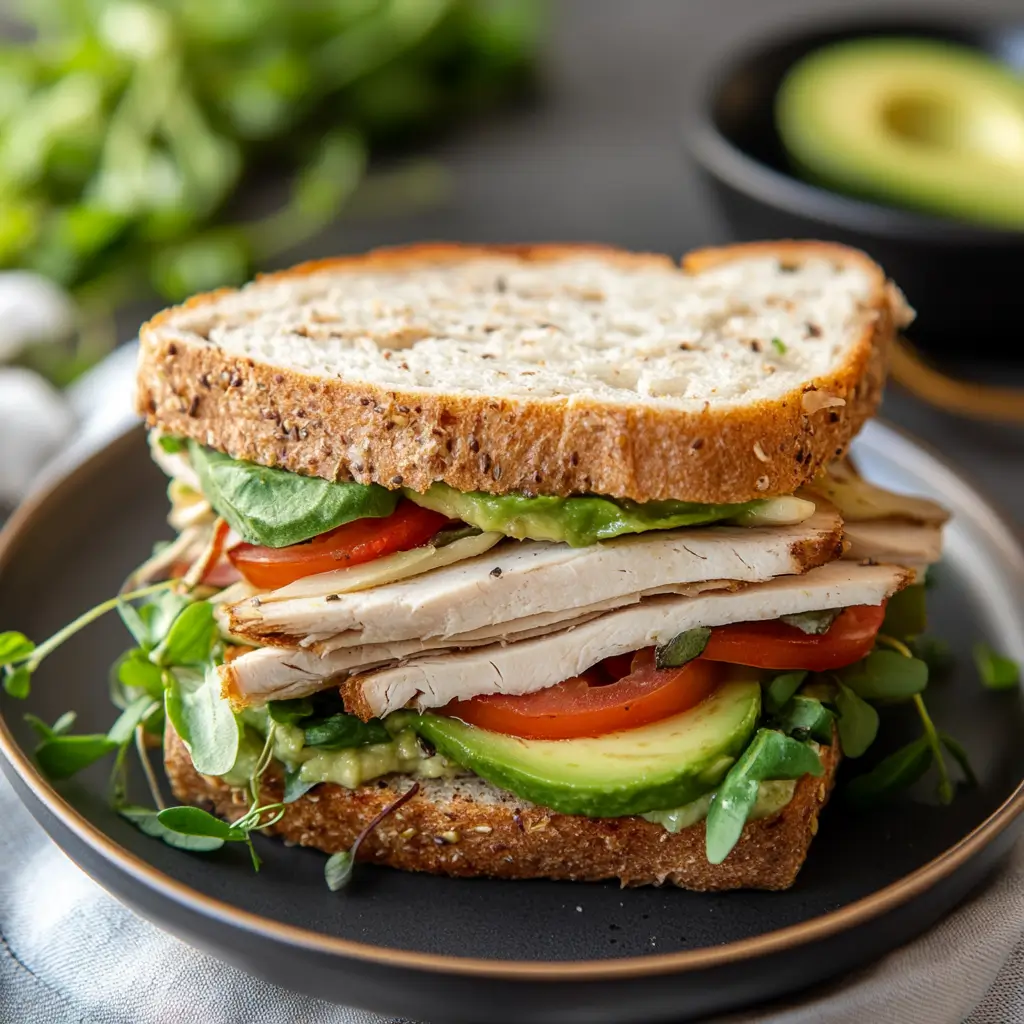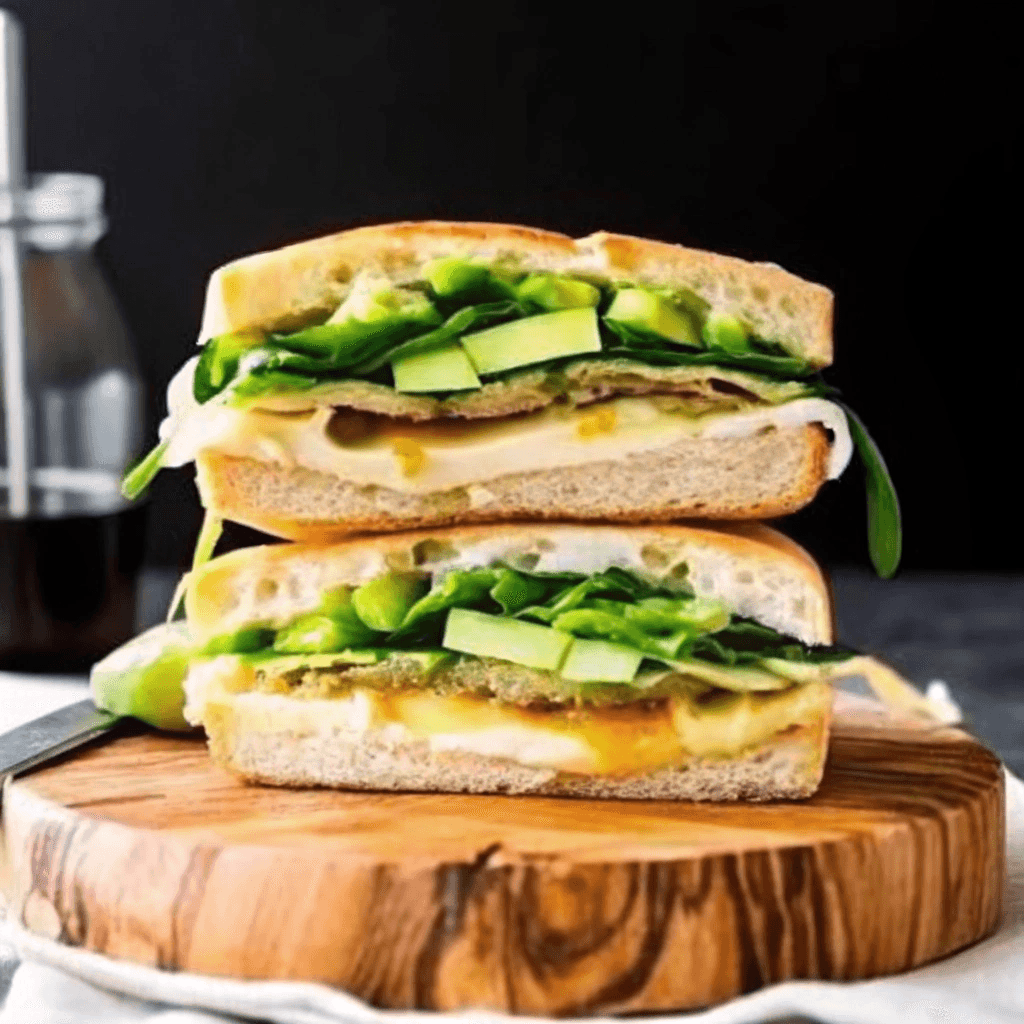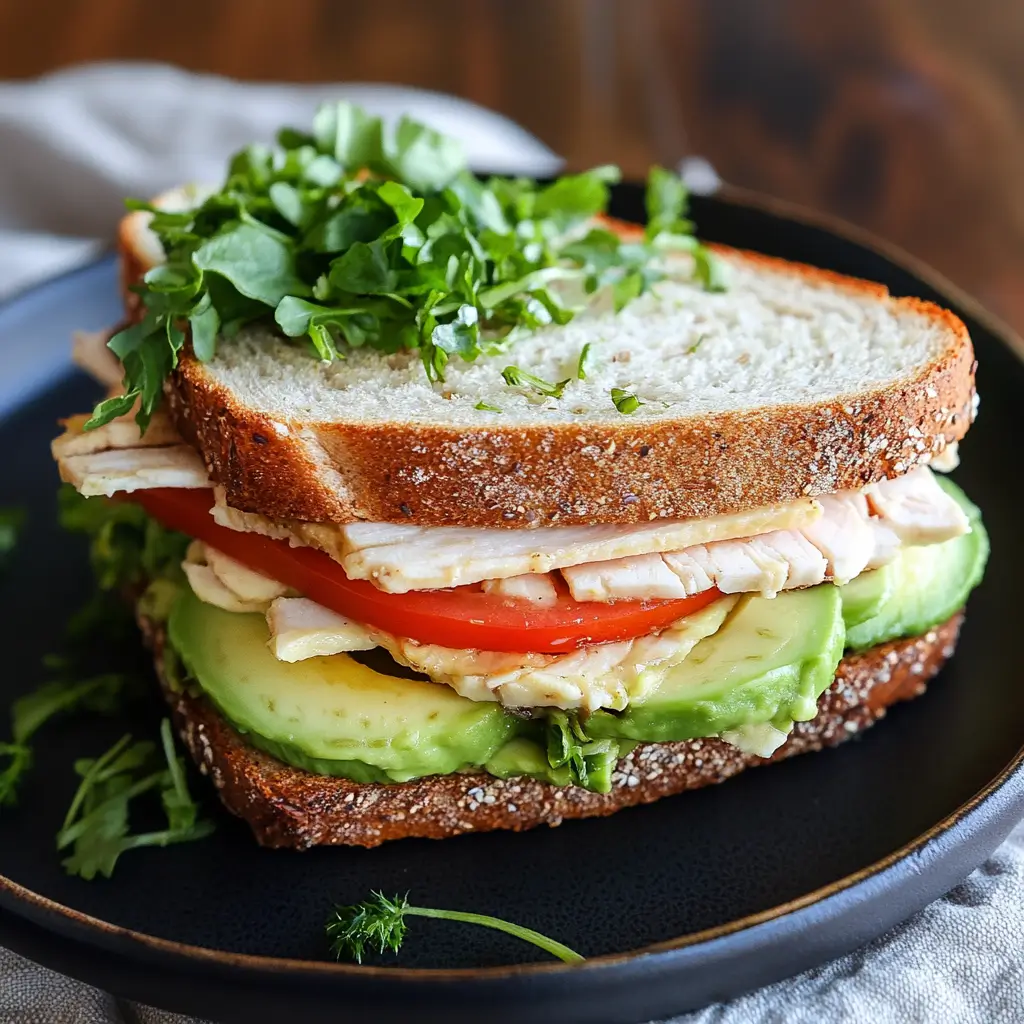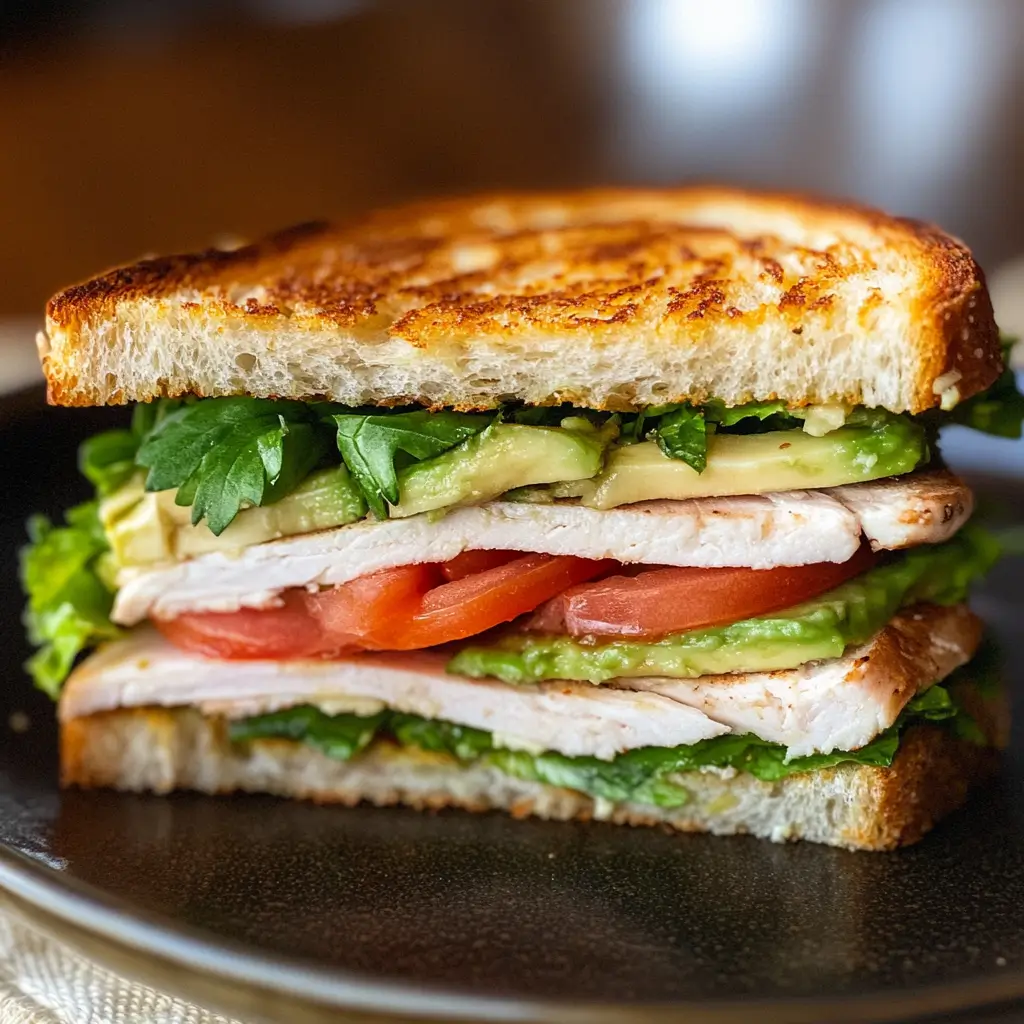Turkey and avocado sandwiches are a popular choice for lunch, offering a mix of lean protein, healthy fats, and satisfying flavor. But is a turkey and avocado sandwich good for you? This article takes a deep dive into the nutritional aspects of this meal, its health benefits, potential drawbacks, and tips to make it even healthier. By the end, you’ll have a complete understanding of how this sandwich fits into a balanced diet and what makes it a standout option among other quick meals.
Table of contents
Nutritional Breakdown of a Turkey and Avocado Sandwich
What Makes Up a Turkey and Avocado Sandwich?
At its core, a turkey and avocado sandwich combines a few simple ingredients: slices of lean turkey, creamy avocado, and bread. What elevates its nutritional profile depends on your choice of bread and any add-ons you include. Whole-grain bread provides a wealth of fiber and essential nutrients, while white bread, though soft and fluffy, often lacks the same nutritional density.

The turkey, a key player, is loaded with lean protein, making it an excellent choice for muscle building and maintenance. Avocado, on the other hand, supplies monounsaturated fats, which are known to support heart health. Together, these ingredients offer a balanced mix of protein, healthy fats, and carbohydrates.
Calories and Macronutrients
A typical turkey and avocado sandwich delivers around 400-500 calories, depending on portion sizes and extra toppings. Here’s a rough macronutrient breakdown:
- Protein: Turkey packs about 20-30 grams of protein per serving, making it the sandwich’s muscle-fueling superstar.
- Fats: One-half of an avocado contributes about 10-15 grams of healthy fats.
- Carbohydrates: The bread adds around 30-40 grams of carbs, essential for quick energy.
This balance makes the sandwich a well-rounded meal that can keep you energized without overloading you on calories.
Vitamins and Minerals
Beyond macronutrients, a turkey and avocado sandwich is rich in vital micronutrients. Turkey provides a healthy dose of B vitamins, including niacin and vitamin B6, which are essential for energy metabolism. Meanwhile, avocado shines with potassium, magnesium, and vitamin E—nutrients that support everything from heart health to glowing skin.
This sandwich is also a good source of dietary fiber, especially when paired with whole-grain bread. Fiber aids digestion, keeping your gut healthy and helping you feel full longer.
Health Benefits of Turkey in the Sandwich
Why Turkey Is a Great Protein Source
When it comes to protein, turkey is hard to beat. It’s lean, meaning it has very little fat compared to other meats like beef or pork. This makes it an excellent choice for those watching their fat intake. But why does this matter? Protein is the building block of muscles, skin, and tissues, and lean sources like turkey provide what your body needs without extra calories from fat.

If you’re wondering, is a turkey and avocado sandwich good for you, the answer lies partly in this protein punch. Just one serving of turkey delivers all nine essential amino acids, which are vital for repair and recovery. This makes turkey a standout option, whether you’re hitting the gym or just need a satisfying lunch.
Low Saturated Fat Content
Another reason turkey stands out is its low saturated fat content. Saturated fats are linked to high cholesterol levels, which can lead to heart problems over time. By choosing turkey, you’re keeping your saturated fat intake in check without sacrificing flavor or protein. Is a turkey and avocado sandwich good for you? Absolutely, especially when you consider turkey’s role as a lean, heart-healthy protein source.
Compared to processed deli meats like salami or bologna, turkey is much cleaner and healthier. It’s also a great alternative to higher-fat cuts of red meat, making it a heart-smart choice for sandwiches. The protein and low-fat combo help maintain steady energy levels throughout the day, perfect for staying productive.
The Role of Avocado in Enhancing Nutritional Value
Healthy Fats from Avocado
Avocado isn’t just a trendy topping; it’s packed with monounsaturated fats, the kind that supports heart health. These fats can help lower bad cholesterol (LDL) while increasing good cholesterol (HDL). If you’re asking yourself, is a turkey and avocado sandwich good for you, avocado’s fat content makes a strong case for the “yes” column.
These fats also have anti-inflammatory properties, which means they can help reduce the risk of chronic conditions like arthritis and even certain heart diseases. Avocado makes the sandwich creamy and delicious, all while boosting its health benefits.

Rich in Fiber and Antioxidants
One of avocado’s unsung heroes is its fiber content. Just half an avocado provides about 7 grams of dietary fiber, which helps keep digestion running smoothly and makes you feel full longer. This can be especially helpful if you’re using a turkey and avocado sandwich as a midday meal to keep you satisfied until dinner.
Additionally, avocado is loaded with antioxidants, like vitamin E and lutein. These nutrients help fight oxidative stress, which can damage cells over time. Pairing avocado with turkey creates a powerful nutritional team: protein for energy and recovery, and antioxidants for long-term wellness.
So, when considering is a turkey and avocado sandwich good for you, it’s clear that avocado plays a vital role in making this meal both delicious and nourishing.
Potential Drawbacks to Consider
Hidden Calories from Add-Ons
While turkey and avocado sandwiches are packed with nutrients, extra toppings can quickly raise the calorie count. Ingredients like mayonnaise, cheese, and sugary sauces might seem harmless, but they can significantly boost the sandwich’s fat and sugar content. If you’re asking, is a turkey and avocado sandwich good for you, consider how these add-ons might overshadow the health benefits.
Instead, opt for lighter spreads like mustard or hummus. Better yet, stick to fresh toppings like cucumbers, lettuce, or tomato slices to enhance flavor and texture without piling on empty calories.
Allergies and Sensitivities
It’s also important to consider potential food sensitivities. For example, if you’re sensitive to gluten, choosing traditional bread might cause digestive discomfort. Avocado, although rare, can trigger allergies in individuals sensitive to latex. This doesn’t mean you have to skip the sandwich altogether—options like gluten-free bread or alternative spreads can keep this meal enjoyable and safe.
For more tips on crafting allergy-friendly meals, check out the Ultimate Guide to Crack Chicken Dip on Zena Recipes.
Tips for Making a Healthier Turkey and Avocado Sandwich
Choosing the Right Bread and Fillings
To keep your sandwich both tasty and nutritious, start with whole-grain or gluten-free bread. Whole grains provide more fiber and nutrients compared to white bread, helping with digestion and satiety. Pairing it with fresh veggies like spinach or bell peppers adds crunch and an extra nutrient boost.

When you’re preparing your sandwich, remember: less is more. Stick to high-quality turkey slices and fresh avocado to highlight the natural flavors.
Portion Control and Balance
The key to making a turkey and avocado sandwich good for you lies in portion control. Using half an avocado per serving ensures you’re not overloading on fats, even healthy ones. Likewise, measuring turkey slices can help you hit that sweet spot of protein without excessive sodium.
If you’re looking for more healthy meal ideas, explore Zena Recipes’ Delicious Tofu Fried Rice for a nutritious, plant-based alternative to diversify your meals.
By carefully choosing ingredients and watching portion sizes, you can enjoy your sandwich without compromise, answering the question is a turkey and avocado sandwich good for you with a resounding yes!
Comparing Turkey and Avocado Sandwich with Other Popular Options
Turkey and Avocado vs. Ham and Cheese
When it comes to nutritional value, turkey and avocado easily outshine ham and cheese. While ham is flavorful, it’s often higher in sodium and preservatives, which can raise health concerns if consumed regularly. Cheese, though a good source of calcium, can be high in saturated fat, which isn’t ideal for heart health.
On the other hand, a turkey and avocado sandwich boasts lean protein from turkey and monounsaturated fats from avocado, both of which support a balanced diet. If you’ve been wondering, is a turkey and avocado sandwich good for you, the comparison makes it clear: it’s the healthier choice, especially for those aiming to reduce processed foods.
Wraps vs. Sandwiches
Swapping bread for a wrap might seem like a healthier option, but this isn’t always the case. Many wraps are made from refined flour, offering little fiber and essential nutrients. In contrast, whole-grain bread in a turkey and avocado sandwich provides a better source of fiber, which supports digestion and keeps you full longer.
However, wraps do have one edge: they’re portable and less messy, making them a convenient option for on-the-go meals. For a truly healthy wrap, consider using a whole-grain or lettuce wrap to complement the turkey and avocado filling.
Tips for Elevating the Sandwich
Homemade Components
For maximum freshness and control over ingredients, consider making your own bread or seasoning turkey slices with your favorite spices.
Layering for Texture
Include crisp lettuce, sliced cucumbers, or even roasted bell peppers to add crunch and complexity to the sandwich.
Beyond the Plate: Sustainability Considerations
Mindful Sourcing
Opt for sustainably raised turkey and organic avocados to reduce your environmental footprint. Supporting local farmers can further enhance the sandwich’s appeal.
Reducing Food Waste
Use leftover turkey from a roast or repurpose slightly overripe avocados in spreads to minimize waste.
FAQs About Turkey and Avocado Sandwiches
Is this sandwich suitable for weight loss?
Yes, it is! The sandwich is low in calories, high in protein, and packed with healthy fats, making it a satisfying and weight-loss-friendly choice.
How often should you eat turkey and avocado sandwiches?
You can eat it a few times a week as part of a balanced diet. Variety is important to ensure you get all essential nutrients.
Can it fit into a low-carb or keto diet?
Yes! Swap the bread for lettuce wraps or low-carb tortillas to make it keto-friendly. Turkey and avocado are both excellent low-carb options.
What are healthier alternatives for spreads and condiments?
Use mustard, hummus, or Greek yogurt-based spreads instead of mayonnaise. These add flavor without extra calories or unhealthy fats.

